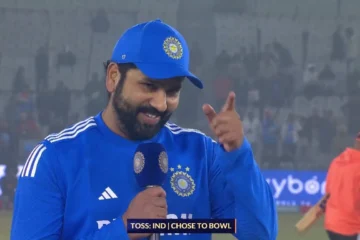Jones Eyes World Cup Glory as Career Comes Full Circle
Tokyo, Oct 30 (AFP/APP): Eddie Jones’s coaching career is set to come full circle when his England side face South Africa in Saturday’s World Cup final in Yokohama.
Jones was the coach of his native Australia when Jonny Wilkinson’s drop goal in the dying seconds of extra time saw England beat the Wallabies in the 2003 World Cup final in his home town of Sydney. Yet two years later Jones was sacked after a run of eight defeats in nine Tests, a dismissal that hurt a proud man and left him with no qualms about coaching against Australia.
Indeed at the 2007 World Cup in France he was a consultant to the South Africa side that beat England in a Paris final. Jones, the son of an immigrant mother whose parents were Japanese, played as a hooker for Sydney club Randwick but failed to win a Test cap.
A teacher who then made the familiar transition into rugby coaching, Jones became a demanding boss well known for outspoken comments in the week of a game that generate headlines but also take pressure off his players.
The latest example came on Monday after Warren Gatland, coach of the Wales side beaten by South Africa in the semi-finals, suggested England could have played their final a week early following their 19-7 win over New Zealand. “Well, guys, can you just send my best wishes to Warren to make sure he enjoys the third and fourth place play-off,” came the acid retort from Jones.
Yet this tournament has also seen Jones deeply moved by the death of Jeff Sayle, his mentor at Sydney’s Randwick club. Jones says he has mellowed since a stroke in Japan six years ago, telling the Guardian last month: “I think I became less intense and learned to relax more. “I’m sure the England players will find that amusing.”
Jones was coach of the Japan side that beat the Springboks 34-32 at the 2015 World Cup, with the win turning him into a cult hero in Japan. The greatest World Cup upset of them all also led to his appointment as England coach after the hosts suffered an embarrassing first-round exit.
Jones’s impact was immediate. A fitter England won a Grand Slam in his first Six Nations and were on a roll that would eventually end in a world-record equalling run of 18 consecutive Test wins against major opposition.
Jones, however, had told biographer Donald McRae in 2016: “Wait until the third season, mate. We might hit a bit of a low then.” His words proved prophetic, with England losing five matches in a row in 2018, but Jones never wavered in the belief that England could win the World Cup in Japan. Last week’s stunning semi-final win over the tournament’s hot favourites, reigning champions New Zealand, was a tactical triumph for Jones.
He was responsible for the V formation that saw England confront the haka in a bid to deny New Zealand a psychological edge before kick-off, as well as the often questioned selection of fullback Elliot Daly — whose run initiated the move that led to Manu Tuilagi’s try in under two minutes.
Jones also chose as his captain Owen Farrell, once seen as a hothead but now a calming influence, and has skillfully switched between using the skipper and George Ford at fly-half in his “horses for courses” strategy during the knockout games.
England defence coach John Mitchell, in charge of the All Blacks’ team beaten by Jones’s Wallabies in a 2003 World Cup semi-final, said there was far more to his boss than smart quips. “He’s a very good coach… He’s always had a kind heart and has always been a guy that has wanted to learn and been willing to share as well.” Meanwhile Jones paid a typical tribute to his backroom staff by saying: “The assistant coaches have done an outstanding job.
“If you look at the percentage of work, I should probably give my money back, but I probably won’t.” If England win the World Cup, however, Jones’s employers at Twickenham will reckon he was worth every penny of his lucrative contract.










